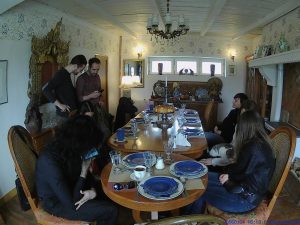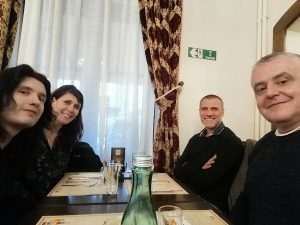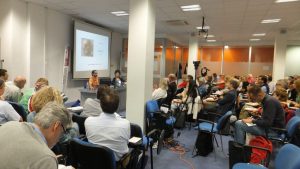Modal Integrative Psychotherapy Curriculum
Updated 2023.
All psychotherapists, philosophers with a practical interest, especially ethicists and political philosophers, and other social scientists, are welcome to the training program in Philosophical Counseling, or Modal Integrative Psychotherapy. Below you will find key aspects of the IPH training program.
This is a 4 year training program that is based on individual mentorship combined with group sessions and exercises. The program is divided into trimesters. After the completion of 3 years the participants receive a conditional certificate allowing them to work with clients while being under supervision until the completion of the full program.

The program is based both on the development of the particular counseling skills and intervention tools, and on the building of a tightly knit community of practitioners and experts.

The curriculum is individualized, based on the participantss’ background, while the core subjects with the pertaining literature include the following, per trimesters:

- 1st Trimester: Technical issues, the concept of philosophical counseling, the relationship between philosophical counseling and the various schools of psychotherapy, key concepts and controversies (the role of the counselor in the counseling progress, the existential issues for the client and the counselor, transference, countertransference, synchronicity). The literature is the first trimester includes writings by Lou Marinoff, Michael Russell, Lydia Amir and other renowned philosophical counselors. As of 2022 the literature for participants speaking the former Yugoslav languages includes Aleksandar Fatic, Integrativna psihoterapija (Integrative psychotherapy), Institut za filozofiju I drustvenu teoriju, Univerzitet u Beogradu, 2020).
- 2nd Trimester: Issues of existential psychotherapy applied to philotherapy. Irvin Yalom and Molyn Leszcz, Theory and practice of group psychotherapy, 5th edition, Basic Books, New York.
- 3rd Trimester: The therapeutic setting and techniques: the role of the personality as a tool in the therapeutic intervention. Irvin Yalom: Lying on the couch, Harper Perennial, New York, 2006.; writings by modern existential psychotherapists.
- 4th Trimester: Psychoanalytic foundations of modern psychotherapy. Key writings by Freud, Melanie Klein and Donald Winnicott.
- 5th Trimester: The Lacanian tradition of psychoanalysis as one of the most powerful therapeutic paradigms, part 1. Lacan’s key ideas, similarities and divergence from the ‘Freudian psychoanalysis’. Seminar on Anxiety and selected literature by modern Lacanians.
- 6th Trimester: First key modern Lacanian paradigm: Paul Verhaeghe. Literature: Vergaeghe, On being normal and other disorders: A manual for psychodiagnostics, Routledge, London, 2008.
- 7th Trimester: Second key modern Lacanian paradigm: Jonathan Redmond. Literature: Redmond, Ordinary psychosis and the body: A Contemporary Lacanian Approach, Melbourne, Palgrave, 2014. Writings by Bruce Fink.
- 8th Trimester: The Jungian development of psychoanalysis. Literature: Jungs’ writings. For the most successful participants, this also includes Jung’s The Red Book.
- 9th Trimester: The concept of psychopathology in the psychoanalytic interpretation. Comparative review of Freud’s ideas through their reception by the later psychoanalysis through to the modern psychodynamic psychotherapeutic approach (PDT).
- 10th Trimester: The epistemology of psychotherapy. Psychotherapeutic applications of ideas by Gilbert Ryle, Alfred Ayer, John Bigelow, Frank Jackson.
- 11th Trimester: Language in psychotherapy: Wittgenstein’s ideas and his relationship with Freud. Later receptions of the ideas from Wittgenstein’s Tractatus and Lacan’s independent development of the same ideas.
- 12th Trimester: Modal logic as the foundation of integrative psychotherapy based on philosophical counseling. Literature: Aleksandar Fatic, Philotherapy: An integration of psychotherapy, Lexington Books of Rowman and Littlefield Press, New York, 2023; Johan Galtung writings on modality in conflict-resolution and negotiation.
- 13th Trimester: The transactional nature of therapeutic process. Literature from transactional analysis including, for speakers of the former Yugoslav languages, works by Zoran Milivojevic (Emotions — Emocije, and Formulas of love — Formule ljubavi).
- 14th Trimester: A decision-making perspective of the transactional theory: psychotherapeutic interpretations and applications of the ancient texts: Sun Tzu: The Art of War, London: Flame Tree Publishing, 2020.
- 15ht Trimester: The concept of fellow-feeling, its systematization and conceptual structure of empathy and sympathy: Max Scheler, The Nature of Sympathy. Modern sentimentalist approaches based on Michael Slote.
- 16th Trimester: Modal Integrative Psychotherapy by IPH: methodological peculiarities of MIP as a model of therapy based on philosophical counseling. Modern works in MIP by members of the philosophical counseling network and by IPH members.

